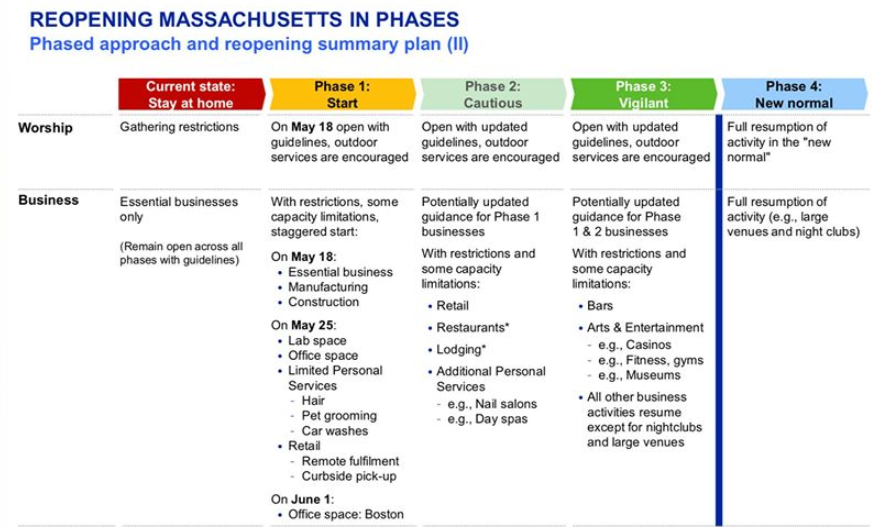[broadstreet zone=”80100″]
BOSTON – Massachusetts Governor Charlie Baker unveiled more details on the state’s re-opening plan today, May 18 at a press conference at 11 a.m.
“The toll this virus takes, and continues to take, is staggering,” said the Governor. “The fight has been brave & vigor.”
“Today, we start the phase return to our new normal,” said the Governor.
“Today we layout a road map to re-open Massachusetts,” said Gov. Baker.
“We can not move forward unless we commit to limit the spread (of the virus),” said the Governor.
[broadstreet zone=”58610″]
The plan progresses through four phases, only when the public health data supports it, explained the governor.
Each phase is about 3 weeks long, said the Governor.
The report layout not only when businesses can re-open, but how, explained Gov. Baker.
On May 25, retail may offer curb-side services. Barber shops and hair salons may open with strict restrictions.
The stay-at-home restrictions by the Governor continue but will some new rules.
The new Safer at Home Advisory instructs everyone to stay home unless they are headed to a newly opened facility or activity.
It also advises those over the age of 65 and those with underlying health conditions to stay home with the exception of trips required for health care, groceries, or that are otherwise absolutely necessary.
All residents must continue to wear a face covering in public when social distancing is not possible, and individuals are advised to wash their hands frequently and be vigilant in monitoring for symptoms.
Restrictions on gatherings of more than 10 people remain in effect.
The Governor said he is asking employers to allow employees working remotely whenever possible, along with this 4-phased plan.

Under phase one, some businesses will open on May 25 and some on June 1.
Earlier today, the Baker-Polito Administration announced construction & manufacturing sectors could re-open immediately, if they adhere to struck protocols.
These first steps have limited face-to-face operations, said Governor.
The Administration also announced that houses of worship, like churches, temples & mosques could re-open, but at no more than 40% capacity for any service. All houses of worship also have struct guidelines to follow. Click here to read them.
[broadstreet zone=”70106″]
On May 25, retail may offer curb-side services. Barber shops and hair salons may open with strict restrictions. (Those will be posted when available from the administration.)
Lt. Governor Karyn Polito said the state has formed a new restaurant working group to establish protocols for when they can re-open.
Lt. Gov. Polito said businesses that are essential businesses, that have been open during the pandemic, must comply with the state’s new manadatory protocols by May 25.
New sectors opening must comply with the mandatory protocols before they can open, said the Lt. Gov.
Each sector will have a document that will include mandatory safety practices, staffing & operations, and cleaning requirements, explained Lt. Gov.
Businesses will self-certify, said the Lt. Governor.
Businesses must develop a COVID-19 set of guidelines on how they will limit the spread of the virus. The Lt. Governor said there is a template for each sector of business.
“We know that many of our home-grown businesses are struggling,” said Lt. Governor.
Campgrounds, pools, youth sports will open in phase 2, said the Lt. Governor.
Phase 2 and phase 3 business and sector guidelines will be available today on the Commonwealth of Massachusetts’ website, said the Lt. Governor.
“Massachusetts has been one of the hardest hit states in the country,” said the Lt. Governor.
[broadstreet zone=”70107″]
Based on the public health metrics, manufacturing facilities and construction sites will open effective today with applicable guidelines.
Places of worship will be able to open with guidelines that require social distancing and encourage services to be held outdoors.
Hospitals and community health centers that attest to specific public health and safety standards can begin to provide high priority preventative care, pediatric care and treatment for high risk patients.
Under a staggered approach, additional Phase 1 sectors of the economy will be permitted to open effective May 25 including:
- Lab space;
- Office space;
- Limited personal services, including: hair salons, pet grooming, car washes;
- Retail: remote fulfilment and curbside pick-up;
Also permitted to open on May 25 with applicable guidelines, are the following:
- Beaches;
- Parks;
- Drive-in movie theaters;
- Select athletic fields and courts;
- Many outdoor adventure activities;
- Most fishing, hunting, and boating;
- Outdoor gardens, zoos, reserves, and public installations.
Additional sectors expected to open on June 1 as part of Phase 1 include office spaces in the city of Boston with applicable guidelines.
[broadstreet zone=”59984″]
Reopening Massachusetts In Phases:
The goal of this phased reopening plan is to methodically allow businesses, services, and activities to resume, while avoiding a resurgence of COVID-19 that could overwhelm the state’s health care system and erase the progress made so far.
- Each phase will last a minimum of three weeks and could last longer before moving to the next phase;
- If public health data trends are negative, specific industries, regions, and/or the entire Commonwealth may need to return to an earlier phase;
- The Commonwealth will partner with industries to draft sector-specific protocols in advance of future phases (example: restaurant-specific protocols will be drafted in advance of Phase 2);
- If we all work together to defeat COVID-19, we can proceed through each phase.
Success in earlier phases will refine criteria for future phases including travel, sizes of gatherings, as well as additional retail openings, lodging and accommodations, arts, entertainment, fitness centers, museums, restaurants, youth sports, and other activities.
[broadstreet zone=”70106″]
Industry-Specific Guidance:
Businesses are not required to reopen, and may not do so if they are unable to follow safety protocols. The Baker-Polito Administration has developed specific guidance so that each industry reopens as safely as possible. Businesses are expected to implement these protocols in addition to the more general Mandatory Workplace Safety Standards.
As of May 18, materials for the sectors eligible to open in the first phase of reopening are included on the mass.gov/reopening website. Guidance for sectors opening in later phases will be posted online in advance of those phases.
In order to reopen, businesses must develop a written COVID-19 Control Plan outlining how its workplace will prevent the spread of COVID-19. Required materials are located on mass.gov/reopening, and include detailed sector-specific circulars and checklists to facilitate compliance.
Self-Certification for Businesses:
Required materials for businesses to self-certify are located on mass.gov/reopening, and include:
- COVID-19 Control Plan template, which must be retained on premises and provided in the event of an inspection;
- Compliance Attestation poster to be posted in a location visible to employees and visitors indicating a completed COVID-19 Control Plan; and,
- Other posters and signs describing rules for maintaining social distancing, hygiene protocols, as well as cleaning and disinfecting.
Businesses operating to provide Essential Services, as defined in the Governor’s March 23, 2020 Executive Order, updated on March 31, April 28, and May 15, may remain open and have until May 25, 2020 to comply with the general workplace safety standards, as well as their industry’s sector-specific protocols.
[broadstreet zone=”53820″]
Health Care:
Effective May 18, hospitals and community health centers who attest to meeting specific capacity criteria and public health/safety standards will be allowed to resume a limited set of in-person preventative, diagnostic and treatment services.
Effective May 25, other health care providers who attest to meeting these standards may resume limited in-person services.
Services that may be performed are limited, based on the provider’s clinical judgment to high-priority preventative services, including pediatric care, immunizations, and chronic disease care for high-risk patients, and urgent procedures that cannot be delivered remotely and would lead to high risk or significant worsening of the patient’s condition if deferred.
In order for the phased in hospital expansion and non-hospital reopening, the following statewide metrics must be met:
- 30 percent of hospital ICU beds (including staffed surge capacity) must be available;
- 30 percent of total hospital beds (including staffed surge capacity) must be available.
[broadstreet zone=”59982″]
As a precursor, health care providers must meet the following requirements to reopen or expand services, which include:
- Attesting to public health standards and specific guidelines;
- Ensuring adequate personal protective equipment is on hand, reliable supply chain and other supplies and policies in place;
- Infection control readiness (workflow, cleaning, social distancing, etc.);
- Workforce and patient screening and testing protocols; and,
- Hospitals must have ≥ 25 percent ICU and total bed capacity and reopen pediatric ICU and psychiatric beds if they had been repurposed for surge capacity.

Child Care:
The Commonwealth’s mission in reopening is to increase access to child care and youth programs while continuing to protect children and staff and preventing the spread of COVID-19. Child care and summer recreation camps will reopen in a phased approach. The Departments of Early Education and Care and Public Health are developing guidelines that balance families’ need for child care with health and safety. The initial reopening plan will focus on families who have no safe alternative to group care by increasing emergency child care capacity. EEC will also partner with industries returning to work to develop options specific to their workplaces.
In March, the Baker-Polito Administration stood up an emergency child care system to support children of essential workers and vulnerable families with extra virus mitigation protocols. During Phase 1, the emergency child care system we have already in place will be utilized to meet the needs of people with no alternatives for care. Currently, only 35% of the 10,000 child emergency child care capacity is occupied and the system has the ability to serve more families to provide care options as more sectors come back online.

Transit:
The MBTA has been and will continue to implement measures to slow the spread of COVID-19 across the system to keep employees and riders safer.
While public transportation unavoidably creates some risk of transmission, working together the MBTA, riders and employers can significantly reduce that risk:
- Riders are required to wear face coverings and must make efforts to distance. Riders are asked to avoid riding transit if they are exhibiting symptoms of COVID-19;
- Employers are encouraged to stagger schedules and implement work from home policies to reduce demand, especially during rush hours;
- The MBTA will continue to take protective and preventative measures such as frequently disinfecting and cleaning vehicles and stations and providing protective supplies to workers.
To mitigate risk while providing appropriate levels of service, the MBTA will:
- Support the transit needs of essential workers and those returning to the workplace in Phase 1 while continuing with limited service to maximize employee and rider safety;
- Ramp up to a modified version of full service by Phase 3, although social distancing efforts will limit effective capacity on vehicles even after full service schedules are restored;
- Actively communicate public health guidance and schedule adjustments in-station, online, and over social media.
[broadstreet zone=”59983″]
Supplies:
In order to operate, all Massachusetts businesses will need to meet the Mandatory Workplace Safety Standards and relevant Sector-Specific Protocols published by the state.
To support businesses, the state has developed a guide to educate business owners on what supplies are needed to return to workplaces, and a portal to connect businesses with manufacturers and distributors.
These are now available to business owners via mass.gov/reopening.
In order to operate, all Massachusetts businesses will need to meet the Mandatory Workplace Safety Standards and relevant Sector-Specific Protocols published by the state.
The state has developed a guide to educate business owners on what supplies are needed to return to workplaces, and a portal to connect businesses with manufacturers and distributors.
Educational materials will be provided to define how an employer should prepare their work spaces to reopen and what products are appropriate for employees to protect themselves at work.
While face coverings are critical, medical grade face coverings are not necessary for non-health care workers.
Editor’s Note: This is a developing report. The Governor & Lt. Governor are speaking live at 11 a.m. and SOURCE will be updating this report in real time.
“We all have roles to play,” said the Governor, who stressed wearing face coverings, wash hands, keeping your distance, and staying vigilant for symptoms for everyone.
The good news is positive test cases and hospitalizations are decreasing, said the Governor.

